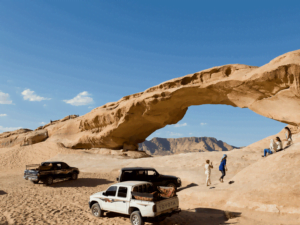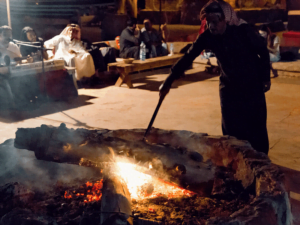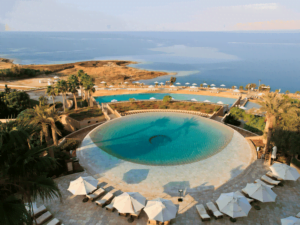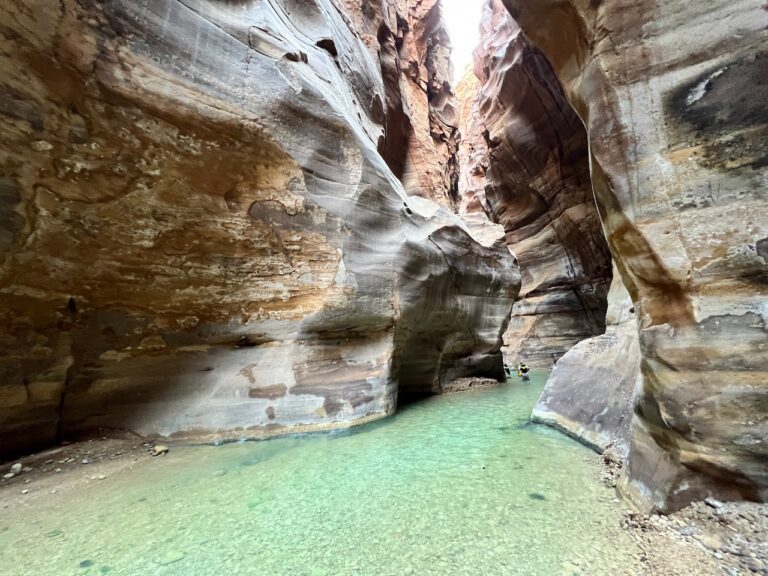Jordan, with its ancient historical sites such as Petra and Wadi Rum, captivates travelers worldwide. However, without proper preparation, one may encounter various difficulties, potentially overshadowing the rich and profound experiences available:
When planning a visit, understanding local customs and travel logistics is crucial.
As of January 1, 2023, entry into Jordan requires adherence to specific visa requirements, which vary based on nationality and purpose of visit. Ensuring compliance with these regulations is essential for a seamless travel experience.
Planning Your Journey
Before embarking on your voyage to Jordan, meticulously confirm your passport’s validity; a minimum six-month validity from your arrival date is mandated for entry.
As you organize your itinerary, factor in Jordan’s climatic variances—spanning arid desert landscapes to cooler highland terrains. Seasonal considerations significantly influence packing decisions, optimizing comfort for your sojourn.
Integral to trip preparation, arrange travel insurance that includes health coverage; unforeseen medical situations necessitate accessible, adequate financial protection.
Timing Your Visit
Strategically planning the timing of your visit to Jordan maximizes both comfort and accessibility. Spring and autumn herald moderate temperatures, ideal for exploring Petra and Wadi Rum. Avoid the scorching summer heat and winter’s cold snaps to ensure a more pleasant experience.
To experience true cultural immersion, align your trip with local festivals such as Ramadan or the Jerash Festival. These periods shine a light on Jordan’s rich customs and offer unique experiences, though some services may be limited due to holiday observances.
Petra by night is a magical experience, illuminated solely by thousands of candles.
Should you wish to visit the Red Sea for diving, winter months are preferable. During this period, aquatic visibility is at its peak and the sea’s rich biodiversity can be experienced more intimately. Moreover, hotel availability is generally more favorable in Jordan’s off-peak travel seasons.
Cultural Norms and Customs
In Jordan, respect for customs is paramount. Dress conservatively, especially when venturing outside urban centers. For women, this typically means avoiding sleeveless tops and short skirts, while men should refrain from wearing shorts.
Direct physical contact between non-related individuals of the opposite sex is generally discouraged. Public displays of affection should be avoided.
When entering a mosque, remove your shoes and ensure that you’re dressed modestly. It’s polite to follow suit in a Jordanian home. These spaces are sanctuaries of spiritual and familial serenity, and showing respect is of utmost importance.
Remember to never use your left hand for eating or giving items to others. The left hand is considered unclean, as it’s traditionally used for personal hygiene. Other gestures to avoid include pointing your feet at someone or using your foot to touch any object that’s shared communally, as this is seen as disrespectful. When in doubt, following the lead of locals is always a wise approach.
Essential Documents
A valid passport is the cornerstone of international travel to Jordan. Ensure it has remaining validity of at least six months from the date of entry into the country.
Visitors from many countries can obtain a visa upon arrival in Jordan. However, it’s prudent to check current visa requirements with the Jordanian embassy or consulate well ahead of your trip.
For those opting for the Jordan Pass, it includes visa entry fees along with access to numerous historical sites. Purchasing this pass before arrival can streamline entry procedures and offer significant savings.
Proof of onward travel or a return ticket may be requested upon entry to verify your travel intentions. Additionally, having hotel reservations or an invitation from a host in Jordan can facilitate a smoother immigration process.
Travel insurance is highly recommended, ensuring coverage for unexpected medical issues and travel disruptions. Ensure that your policy is valid for the duration of your stay in Jordan.
Navigating Transportation
Jordan offers varied transit options, from modern air-conditioned coaches and private taxis to the culturally immersive experience of shared minivans known as service taxis. When selecting your mode of conveyance, factor in comfort, time, and budget constraints, along with your appetite for adventure.
For intercity travel, the JETT bus service is a reliable choice with scheduled routes across major tourist destinations. Renting a car provides flexibility and convenience, but ensure you are well-acquainted with local driving customs and regulations.
Airport Transfers and Taxis
Upon arrival in Jordan, various airport transfer options are at your disposal, including licensed taxis, pre-booked private transfers, and ride-sharing applications. Each offers convenience, but that comes with varying price points.
Licensed yellow taxis operate on a metered system, ensuring fair pricing. Remember to inquire if the meter is in use before departure.
For those desiring a seamless transition from air to road travel, arranging a private transfer prior to arrival is prudent. This can offer peace of mind, especially when navigating the terrain after dusk or when traveling with significant baggage.
Travelers seeking cost-effectiveness coupled with comfort may consider utilizing ride-sharing apps such as Uber or Careem. These services provide transparent pricing and the ability to arrange transportation directly from your smartphone, adding an element of ease to the commencement of your Jordanian journey. For authenticity, some travelers opt for “service taxis” when venturing beyond airport bounds.
Car Rentals and Local Transit
Exploring Jordan demands reliable transportation.
Renting a car offers freedom and flexibility to visitors in Jordan. With a wide range of rental agencies at the airport and various cities, travelers can select a vehicle to suit their preferences. Nonetheless, driving in Jordan requires vigilance due to variable road conditions and local driving customs. It’s recommended to be cautious, especially when traveling on less frequented routes.
Public transport is limited, especially in rural areas.
Many travelers opt for car rentals for convenience. However, understanding local traffic laws and customs is essential – turning signals, for instance, might be used differently than travelers are accustomed to. It’s also important to have comprehensive insurance coverage for peace of mind while exploring.
Navigating Jordan with a rental car offers unparalleled freedom.
Renting a vehicle equips travelers with the autonomy to explore Jordan’s enchanting landscapes at their own pace, from the ancient ruins of Petra to the stark beauty of Wadi Rum. Rental contracts have evolved to become more tourist-friendly since 2023, including insurance policies that cover the usual challenges faced on Jordanian roads. Such provisions ensure a safer and more enjoyable experience across the country’s diverse terrain.
Discovering Jordanian Cuisine
Amidst Jordan’s storied landscapes and rich cultural tapestry, there lies a culinary odyssey waiting to be explored. Jordanian cuisine is a testament to the country’s history, with every dish having its own narrative that weaves flavors with tradition. Each meal becomes a confluence of sensory indulgence, where staples like Mansaf—Jordan’s national dish made of lamb, yogurt, and rice—tell a story of nomadic heritage through taste. Modern Jordanian tables invite diners to savor Maqluba, a savory upside-down rice casserole, or to delight in the subtleties of regional mezze, crafting a vibrant mosaic of local and borrowed gastronomic accents. To truly understand Jordan, one must not only traverse its plains and canyons but also navigate the depths of its culinary heritage.
Must-Try Dishes
Mansaf, the crown jewel of Jordanian cuisine, demands every visitor’s palate indulge in its sumptuous flavor profile.
Since antiquity, the Bedouins fashioned Mansaf into a communal expression of hospitality, transcending its ingredients to symbolize a unifying cultural experience, relished across all of Jordan.
Likewise, Maqluba, with its name meaning “upside down,” captivates with its layers of seasoned rice, vegetables, and meat, flipped to reveal a sumptuous feast, emblematic of the Levant’s culinary ingenuity.
The inventive Jordanian mezze, a collection of small dishes such as hummus, baba ghanoush, and tabbouleh, is an intricate sampler of the region’s rich flavors, providing a palate-pleasing prelude to Jordan’s gastronomic symphony.
For those with a penchant for sweets, Knafeh’s sweet, cheese-filled layers, topped with syrup and pistachios, provide an irresistible finale to any Jordanian meal.
Street Food and Fine Dining
Indulge your senses in Amman’s vibrant food scene.
Roaming the streets of Jordan’s capital, your nostrils are tantalized by the scents of freshly prepared eats. From sizzling falafel to aromatic cups of mint-infused tea, the nation’s character is epitomized through its street food offerings, ready to be savored amidst lively chatters and bustling markets. Conversely, fine dining presents a distinct facet, elevating the rich tapestries of local flavors through exquisitely prepared dishes and sophisticated ambiance.
Embrace local street fares and market specialties.
Culinary curiosity is rewarded in Jordan – whether by sampling street food or exploring upscale establishments. Street vendors and high-end chefs alike are ambassadors of Jordanian tradition, infusing time-honored recipes with contemporary nuances, culminating in diverse and rich dining experiences that resonate deeply with Jordanian culture.
And don’t miss the upscale culinary adventures.
Reserved for those seeking exemplary culinary craftsmanship are Jordan’s fine dining venues, which marry indigenous ingredients with global gastronomic trends – a testament to the country’s evolving palate – providing a truly unique Jordanian fine dining experience right up to the present 2023 dining landscape. Here, excellence in cuisine converges with service, ensuring a transcendent meal that honors both tradition and modern epicurean pursuits.
Unmissable Attractions
Jordan’s historical legacy beckons with iconic sites, foremost the ancient Nabatean city of Petra, a UNESCO World Heritage Site. Visitors are compelled toward the Al-Khazneh temple, an architectural masterpiece hewn directly from rose-colored cliffs. Nearby, the lunar-like landscape of Wadi Rum invites the intrepid traveler to explore its vast red dunes and timeless bedouin culture. No journey to Jordan would be complete without floating in the saline-rich waters of the Dead Sea, set against a backdrop where history and geography converge in tranquil harmony. These landmarks are essential pieces in the mosaic that defines Jordan’s unparalleled allure.
Historical Sites and Ancient Ruins
Jordan’s landscape is a palimpsest of history, vividly etched with the remnants of bygone civilizations.
- Petra: The illustrious archaeological site with majestic structures like the Treasury and the Monastery.
- Jerash: A stunning example of well-preserved Greco-Roman architecture.
- Umm Qais: Home to the ruins of Gadara, offering panoramic views of the Sea of Galilee.
- Amman Citadel: A historical site featuring the Temple of Hercules and Umayyad Palace.
- Karak Castle: A crusader stronghold with a labyrinth of stone-vaulted halls and endless passageways.
- Pella: Contains layers of ancient civilizations, a must-see for history buffs.
Each site captures a unique narrative from Jordan’s rich tapestry of cultural heritage.
Visiting these ancient sites is akin to traversing through different epochs, each presenting a distinct facet of Jordan’s multifaceted historical identity.
Natural Wonders and Adventures
Jordan’s diverse terrain is a sanctuary for nature lovers and thrill-seekers alike.
- Wadi Rum: Traverse the red sands of this vast desert, also known as the Valley of the Moon.
- Dead Sea: Float effortlessly in the hyper-saline waters at the Earth’s lowest point on land.
- Dana Biosphere Reserve: Explore Jordan’s largest nature reserve with its diverse ecosystems.
- Aqaba: Dive into the Red Sea’s vibrant coral reefs and marine life.
- Mujib Biosphere Reserve: Experience the excitement of canyoning in the world’s lowest nature reserve.
The experience of engaging with Jordan’s environment is transformative.
These natural attractions offer a journey through scenic landscapes and adrenaline-induced activities, crafting indelible memories.








